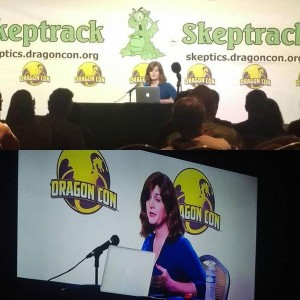This past Labor Day weekend I attended Dragon Con, the ginormous science fiction and pop culture convention, which includes a programming track known as the SkepTrack (“Skeptics at Dragon Con”). Run by Derek Colanduno and Robynn “Swoopy” McCarthy of Skepticality fame, it’s a convention within a convention, and regularly draws big names in skeptical or rationalist thought and activism.
For 2015, for example, presenters included James “The Amazing” Randi, Richard Carrier, David Silverman, Barbara Drescher, Tim Farley, and a nonzero number of Novellas. SkepTrack is a much bigger deal within the movement than people realize, and it could easily spin off into its own con, if Derek and Swoopy were so inclined.
This year, for the second time, I was privileged to give a presentation as part of SkepTrack. My too-generic and under-informative title was “Gender Identity For The Skeptical Mind.” Like last year, I talked about what it is to be transgender, whether there’s an inherent conflict in being a skeptic with gender dysphoria, and what the religious right believes about gender dysphoria. I’ll distill my talk down into later posts.
I was scheduled for Monday morning, the last day of Dragon Con, at 11:30. Frankly, I’m never crazy about being scheduled so late in the event; I have a bad tendency to procrastinate, and I don’t like having an impending talk hanging over my head like a sword of Demosthenes (to coin a mixed metaphor) while I try to enjoy the convention. Also, Monday mornings are not the time when the biggest audiences are to be found.
Nevertheless, my talk went great! I got Derek to give me a brief introduction, just because that always makes me feel more important. The room at the Atlanta Hilton was half full, which is more impressive when you know the SkepTrack’s space is  twice the size of most of the other track rooms. The attendees were polite and attentive; I made them laugh several times, and they seemed genuinely interested in what I had to say. In a key part of my presentation, I described how the transphobic right likes to compare gender dysphoria to anorexia, and the audience was duly horrified by my illustration of why it’s such a baseless, evil lie to draw that comparison.
twice the size of most of the other track rooms. The attendees were polite and attentive; I made them laugh several times, and they seemed genuinely interested in what I had to say. In a key part of my presentation, I described how the transphobic right likes to compare gender dysphoria to anorexia, and the audience was duly horrified by my illustration of why it’s such a baseless, evil lie to draw that comparison.
I ran short, clocking in at only about 20 minutes (like last year; I really need to learn to pace myself better, and dial down the adrenaline), but there was no difficulty filling the rest of my hour by taking questions; a long line formed behind the microphone stand in the aisle. When 12:30 arrived, I had to turn away the last couple of people from the microphone. Even then, after leaving the stage I continued to chat for several more minutes with people who had additional questions and comments for me, or who wanted to take selfies with me.
I’m embarrassed to admit I got several questions this time I couldn’t answer adequately. These questions were mostly from very young people—teenagers, I think—who were transitioning, considering transitioning, or who had friends in transition. Some of them are paddling rough waters, trying to be their authentic selves but meeting a lot of resistance from families, friends, and school officials. Since my own transition didn’t begin until well into adulthood, I simply didn’t have the background needed to answer questions like these, and more often than not I had to refer questioners to the Internet for help. I was ashamed.
But Marc, a member of SkepTrack’s staff, had a great suggestion for Derek and me. He suggested that for next year I should put together

and moderate a panel comprising several other transgender people, with a diversity of personal experiences, who can better respond to such questions.
We liked the idea, and Derek said he’d make room for it on the schedule. I told Derek I’d love to do it, but that I wasn’t sure it fit within the SkepTrack’s mission. After all, SkepTrack isn’t about general transgender or even pan-LGBT topics. My solo talk was a justifiable fit since it addresses religious and anti-science asshattery.
Derek countered that Dragon Con should have more LGBT content, and he didn’t know of any other tracks that regularly had any, so why not SkepTrack? Furthermore, he added, gender dysphoria and transgender issues are “Science that’s frequently misunderstood. So it’s a perfect fit.”
I can’t challenge his logic, and I do like this outreach opportunity, although Derek wasn’t quite right to say there’s no other LGBT programming at the con. I searched on “LGBT” in the Events section of Dragon Con 2015’s tablet app, and found five hits:
- “LGBTQIA in YA” in the Young Adult Literature track
- “New frontiers in LGBTQIA fiction” in the Writer’s Track
- “Spectrum Party for LGBTQIA Geeks and Allies,” which is an annual party most recently hosted by the Costuming track, but which in the past has been sponsored by the Brittrack and/or Trek Track
- “Tuff Topics for Parents” in the Kaleidoscope track, which is about kids but for adults/parents; this talk included discussion of bullying and cyberbullying and LGBT kids (and Tim Farley was a scheduled presenter)
- “We’re Here, We’re Queer, and We’re Magic” in the Fantasy Literature track
A search for “trans” didn’t turn up any programming; not even my own talk, the description of which phrased the subject as “gender dysphoria,” but it did produce the bio for Erika Ervin, a

transgender model and actress who apparently stars on the FX television series, American Horror Story. She was a guest who participated in Horror track programming about the show. I’m noting Ms. Ervin’s attendance here just to document that I did a thorough search. I know nothing about her, or about American Horror Story, and for all I know she didn’t say anything about LGBT or transgender stuff in the events she took part in.
Anyway, it looks like there’s room to expand Dragon Con’s LGBT-themed content, and SkepTrack is a good fit for it; the kayak of organized skepticism has often bobbed in the rapids of the culture wars. If any of you reading this disagree, I’d love to know your argument.
Derek promised to give me an earlier slot on the schedule for next year, and he explained his motivation for banishing me to the Monday badlands in the past: the crowds on Saturday and Sunday are much larger, so they have more “assholes” who are likely to offer belligerent or transphobic questions and comments.
I assured him I’m well able to deal with the assholes.
